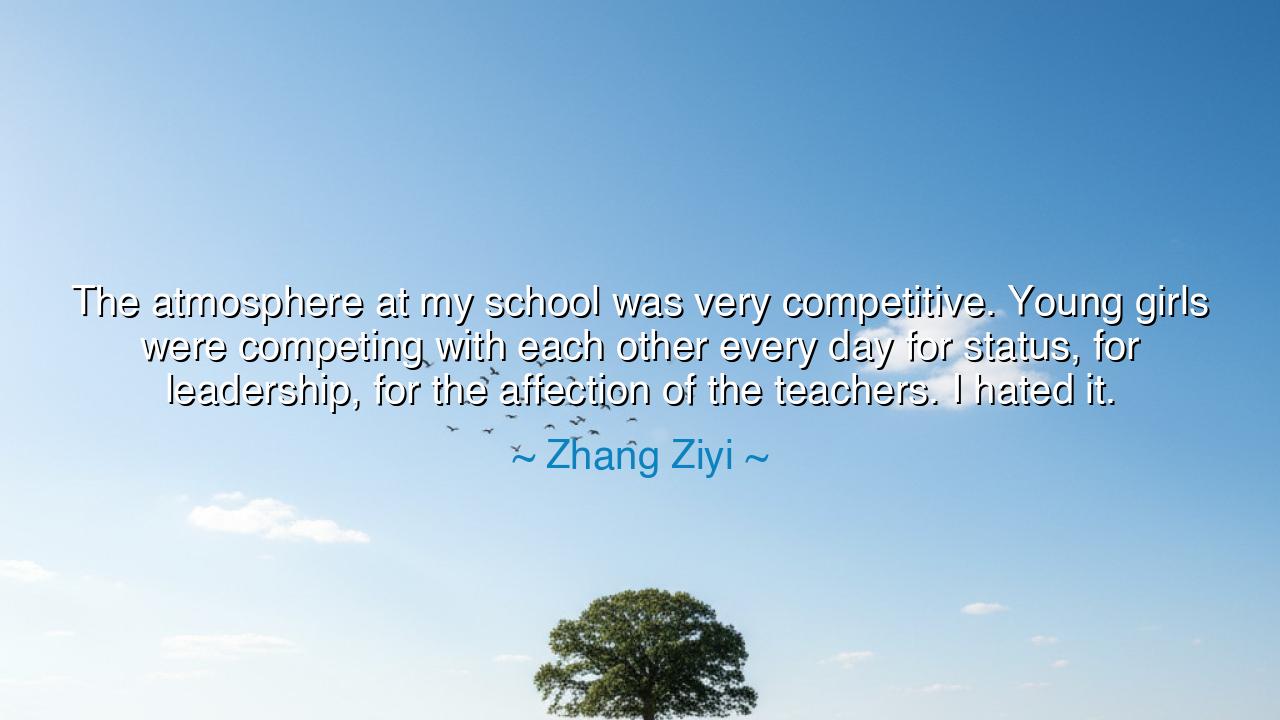
The atmosphere at my school was very competitive. Young girls
The atmosphere at my school was very competitive. Young girls were competing with each other every day for status, for leadership, for the affection of the teachers. I hated it.






The words of Zhang Ziyi — “The atmosphere at my school was very competitive. Young girls were competing with each other every day for status, for leadership, for the affection of the teachers. I hated it.” — are not merely a recollection of youth, but a reflection on the nature of ambition, comparison, and the loss of innocence in human society. Spoken by one of China’s most celebrated actresses, her words reach far beyond the walls of a school. They speak to the universal struggle of the human heart when it is placed within systems that prize rivalry over growth, appearance over authenticity, and validation over virtue. In her voice is not bitterness, but lament — the sorrow of a soul that has tasted both competition and compassion, and found that only one nourishes the spirit.
To understand her meaning, we must first understand the world of Zhang Ziyi’s youth. She attended the prestigious Beijing Dance Academy, a place known for its discipline, rigor, and excellence — a crucible where talent was forged through relentless pressure. Such an environment produced brilliance, but it also bred anxiety. Each day, as she describes, students were pitted against one another, not only in skill but in status and favor. The race for perfection overshadowed the joy of creation. In her words, we can hear the voice of every child who has ever been told that worth is measured by comparison — who learned to perform not for beauty or truth, but for approval.
This truth is ancient. The Greeks warned against envy as one of the greatest spiritual poisons, and the Buddhists taught that comparison is the root of suffering. When the heart becomes consumed by competition, it loses sight of purpose. Instead of seeking excellence for the love of the art, one begins to seek dominance for the sake of pride. What Zhang Ziyi expresses is the pain of that transformation — the realization that, in the pursuit of being the best, we often cease to be ourselves. True art, true leadership, true affection — these cannot be earned through rivalry; they blossom only in authenticity, humility, and love.
The same story unfolds again and again throughout history. Consider Emperor Ashoka of India, who conquered vast lands through ruthless ambition. Yet after the Battle of Kalinga, he gazed upon the suffering his victories had caused and was stricken with despair. The competition for power had brought only emptiness. In that moment of awakening, he renounced violence and became a servant of peace. Zhang Ziyi’s “I hated it” carries a similar spiritual resonance — a rejection of a system that glorifies rivalry and a yearning for something purer: connection without comparison, art without ego, excellence without cruelty.
Her experience also reveals the deeper truth about feminine rivalry — how young women, in particular, are often taught to compete not just for achievement, but for approval, affection, and belonging. The struggle “for the affection of the teachers” mirrors the wider struggle in society, where validation from authority often replaces the joy of self-discovery. But Zhang’s rejection of this environment becomes an act of rebellion, a declaration of self-worth. She refused to let external validation define her identity. In time, that same inner integrity would become her strength, carrying her from the rigidity of the dance academy to the freedom of the screen, where she would shine not as one among many, but as herself — radiant, authentic, and unyielding.
Her words remind us of a timeless spiritual principle: comparison is the enemy of peace. The moment we begin to measure ourselves against others, we lose the sacred center from which real greatness arises. The flower does not compete with the one beside it; it simply blooms. To live meaningfully, one must turn inward — toward one’s purpose, one’s values, one’s craft — and seek mastery not to surpass others, but to fulfill one’s potential. The joy of creation, whether in art or life, comes not from victory over others but from harmony within oneself.
The lesson in Zhang Ziyi’s reflection is clear and enduring: do not let the spirit of competition consume the spirit of compassion. Strive, yes — but strive with love, not envy. Let excellence be an offering, not a weapon. Create spaces — in schools, in workplaces, in hearts — where cooperation replaces comparison, and where success is measured not by status but by sincerity. In this way, we honor both ourselves and those around us.
Therefore, let her words echo as a teaching to all generations: the heart that competes may rise for a moment, but the heart that creates endures forever. Seek not to win the affection of the crowd, but to earn the peace of your own soul. For in that peace lies the only victory worth having — the victory of living as your truest, most compassionate self, free from the chains of rivalry and alive to the joy of creation.






AAdministratorAdministrator
Welcome, honored guests. Please leave a comment, we will respond soon